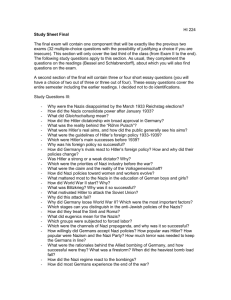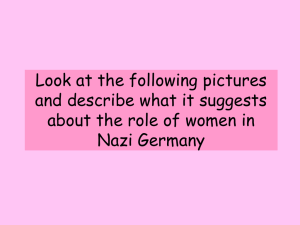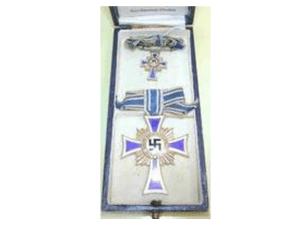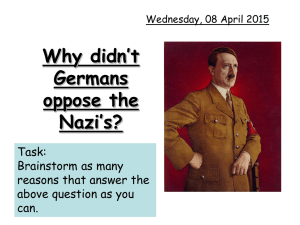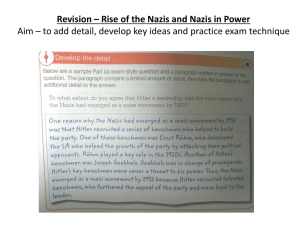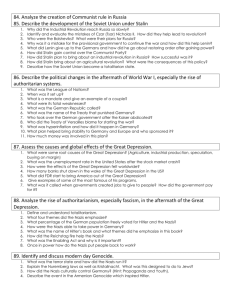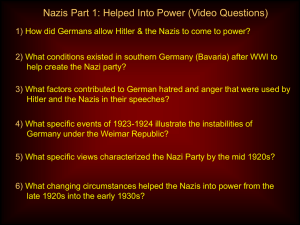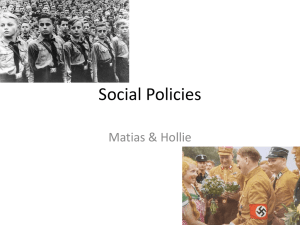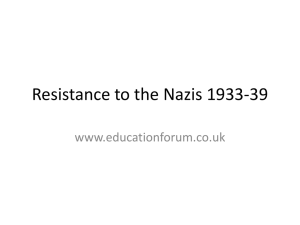Sample essay why nazi remain in power.doc
advertisement
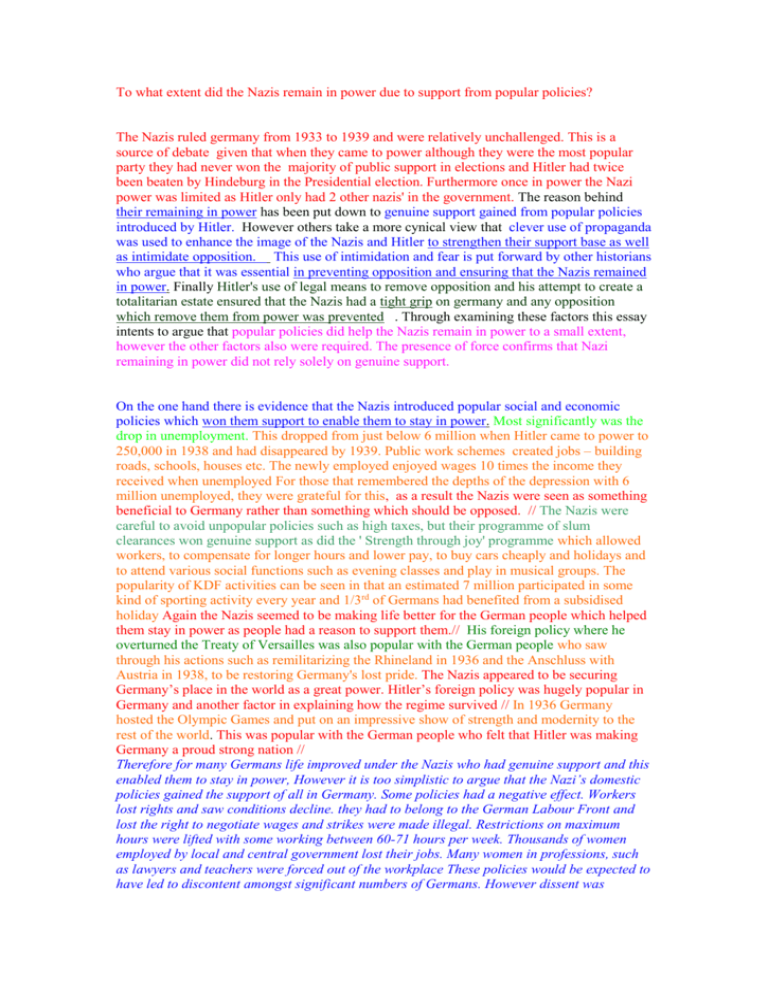
To what extent did the Nazis remain in power due to support from popular policies? The Nazis ruled germany from 1933 to 1939 and were relatively unchallenged. This is a source of debate given that when they came to power although they were the most popular party they had never won the majority of public support in elections and Hitler had twice been beaten by Hindeburg in the Presidential election. Furthermore once in power the Nazi power was limited as Hitler only had 2 other nazis' in the government. The reason behind their remaining in power has been put down to genuine support gained from popular policies introduced by Hitler. However others take a more cynical view that clever use of propaganda was used to enhance the image of the Nazis and Hitler to strengthen their support base as well as intimidate opposition. This use of intimidation and fear is put forward by other historians who argue that it was essential in preventing opposition and ensuring that the Nazis remained in power. Finally Hitler's use of legal means to remove opposition and his attempt to create a totalitarian estate ensured that the Nazis had a tight grip on germany and any opposition which remove them from power was prevented . Through examining these factors this essay intents to argue that popular policies did help the Nazis remain in power to a small extent, however the other factors also were required. The presence of force confirms that Nazi remaining in power did not rely solely on genuine support. On the one hand there is evidence that the Nazis introduced popular social and economic policies which won them support to enable them to stay in power. Most significantly was the drop in unemployment. This dropped from just below 6 million when Hitler came to power to 250,000 in 1938 and had disappeared by 1939. Public work schemes created jobs – building roads, schools, houses etc. The newly employed enjoyed wages 10 times the income they received when unemployed For those that remembered the depths of the depression with 6 million unemployed, they were grateful for this, as a result the Nazis were seen as something beneficial to Germany rather than something which should be opposed. // The Nazis were careful to avoid unpopular policies such as high taxes, but their programme of slum clearances won genuine support as did the ' Strength through joy' programme which allowed workers, to compensate for longer hours and lower pay, to buy cars cheaply and holidays and to attend various social functions such as evening classes and play in musical groups. The popularity of KDF activities can be seen in that an estimated 7 million participated in some kind of sporting activity every year and 1/3rd of Germans had benefited from a subsidised holiday Again the Nazis seemed to be making life better for the German people which helped them stay in power as people had a reason to support them.// His foreign policy where he overturned the Treaty of Versailles was also popular with the German people who saw through his actions such as remilitarizing the Rhineland in 1936 and the Anschluss with Austria in 1938, to be restoring Germany's lost pride. The Nazis appeared to be securing Germany’s place in the world as a great power. Hitler’s foreign policy was hugely popular in Germany and another factor in explaining how the regime survived // In 1936 Germany hosted the Olympic Games and put on an impressive show of strength and modernity to the rest of the world. This was popular with the German people who felt that Hitler was making Germany a proud strong nation // Therefore for many Germans life improved under the Nazis who had genuine support and this enabled them to stay in power, However it is too simplistic to argue that the Nazi’s domestic policies gained the support of all in Germany. Some policies had a negative effect. Workers lost rights and saw conditions decline. they had to belong to the German Labour Front and lost the right to negotiate wages and strikes were made illegal. Restrictions on maximum hours were lifted with some working between 60-71 hours per week. Thousands of women employed by local and central government lost their jobs. Many women in professions, such as lawyers and teachers were forced out of the workplace These policies would be expected to have led to discontent amongst significant numbers of Germans. However dissent was minimal and the Nazis remained in power easily. Other factors must have made this possible. such as propaganda. Propaganda under Joseph Goebells permeated every part of life from newspapers, radios, films and books all sent a positive message about the Nazis and was important for ensuring the public felt Germany needed the Nazis thereby ensuring they remained in power. // propaganda was also important as it reinforced the idea that Hitler was a messianic figure and responsible for successes in Germany and therefore that he was needed for the success and this also ensured than Nazis stayed in power // Radio was especially important. The Nazi state made they were freely available and cheap. the ‘German Mini Receiver’ cost only 35 marks – a week’s wages. In addition Goebbels broadcast radio from loudspeakers in the streets and ordered all cafes to have their radios turned on for important programmes. Radios were short wave so that they heard only German stations rather than foreign so they only heard Nazi controlled ideas. The radio played an important part in ensuring the Nazis stayed in power through as did mass rallies. // The huge Nuremberg rallies were an important propaganda experience which showed the strength of the Nazis. held in August each year in Nuremburg. A Nuremburg rally lasted a whole week and was held in four specially built arenas outside the town. Just one of these arenas could hold 400,000 people. There they watched the flags, air force fly pasts, fireworks, army parades and gymnastic and listened to massed choirs, brass bands and speeches. Although propaganda ensured compliance and support it also worked to prevent opposition through threats. Propaganda was often threatening such as messages in posters ' death to our enemies' and the rallies gave the impression that the Nazis were all powerful and supported by the majority of population and therefore for those that would have thought about opposing felt that resistance was futile. In light of this popular policies did help the Nazis remain in power, however propaganda was effective in promoting the positive impact of the regime. It was effective in persuading large numbers of ordinary Germans that Hitler and his policies were of benefit to themselves and the country. However the Nazis also relied on fear and intimidation to maintain control. Some argue that the Nazi use of fear and terror was a key reason why they were able to remain in power. Certainly there is evidence to support this, for example the Gestapo, the Nazi secret police were reponsible for creating a climate of fear in Germany. They had the power to arrest anybody who spoke out against the Nazi regime and often did so in the middle of the night They had agents based in every town who drew up list of ‘enemies of the people’. The public were encouraged to act as informants of the regime, with children encouraged to spy on their own families. Fear of a visit from the Gestapo , for themselves or their familes, was a powerful incentive not to oppose the Nazis and therefore enabled them to stay in power. The police were controlled by the nazis and they gained more power which made people more scared of standing up against the nazis. The police were given the power to make ‘protective arrests’ of those suspected of opposing Hitler before they commited the ‘crime’ of criticizing the regime. The police had the power to arrest and imprison without the need for a fair trial. New offences and harsher penalties were introduced. Death sentence, which was applicable to 3 crimes when Hitler came to power, was extended to 43 offences within 10 years. The minimum age for the death penalty was lowered to 16. with these increased threats - opposition were put off. The creation of concentration camps by the Nazis for their opponents also served to persuade people not to speak out about the Nazis. The first Concentration camp at Dachau was opened within a month of Hitler coming to power. Enemies of the regime faced brutal conditions. In the camps the power of the SS guards was limitless and included torture. Ill fed inmates were forced to undertake demanding manual labour such as breaking stones in quarries for long hours. The average life expectancy of an inmate was just 9 months. It is estimated that between 1933-1939 more than a quarter of a million passed through the camps Specific actions of the Nazis created a sense of terror, espeically the 1934 night of the long knives attack when Hitler ordered the murder of over 70 Nazi and SA members. The fact that he would order such an attack - on his own party served to create fear of what would be done to the enemies of the nazis and helped silence opposition which helped the nazis remain in power. In this atmosphere it was virtually impossible for ordinary people to challenge the rule of the Nazis, it also suggests that popular policies alone did not ensure the Nazis remained in power . However the creation of a totalitarian state. made it also hard to oppose the nazis and helped them remain in power. The Nazis were able to remain in power due to a lack of opposition through legal means as Hitler used his power to eliminate any potential sources of opposition.. For example following the reichstag fire in 1933 hitler sent 5000 communists to concentration camps. any other political opposition to the nazis was made impossible in --- 1933 when all other political parties were banned.. It was an offence to criticise Hitler or his government. Some socialists and communists did attempt undercover opposition but this made little headway as they were easily infilitrated and prevented from spreading message by gestapo. Therefore in a one party state, with no other political parties allowed it made it easier for nazis to remain in power. Through his attempt at creating a totalitarian state all areas of life were nazified and this acted as a barrier to opposition and therefore helped the nazis stay in power. For example trade unions which were areanas where people can meet and complain and generally stand up for people were banned and so one source of potential oppostiion was removed. the Nazis controlled the legal system, the police force and revamped the legal system so that all judges were nazis. This control also prevented opposition as the german people had none of the usual avenues of support to complain to in. in fact they would risk their own arrest if they complained. Strict press censorship, ensured that the German public were only exposed to new ' accepted and altered by the nazi regime, Newspapers were banned from printing any stories critical of the government. Every morning the editor’s of Berlin’s newspapers had to go to the Propaganda ministry where Goebbels instructed them on what news and headlines to print. Newspapers which printed stories he had not approved were swiftly closed down. which meant they were only hearing the that the nazi regime was successful and therfore no reason to oppose, this was beneficial in allowing the nazis to remain in power. Censorship was used to stop any criticism of the Nazi regime. It ensured that the negative impact of Nazi policies remained hidden to many Germans. It also ensured that those individuals who were concerned about the negative impact of Nazi policies - either on themselves or others – would find it very difficult to voice their opposition Overall the Nazi state remained in control of Germany by use of a carrot and stick approach. On the one hand many people supported the regime as a result of the benefits of popular domestic and foreign policies. Propaganda and Censorship acted further to increase support for the Nazis. After all resistance to the regime never gained popular support from the German people - those who resisted the regime numbered less that 1% of the population – most of whom supported Hitler’s attempt to revive Germany. On the other hand, not everyone benefited from Nazi policies and for those who opposed or objected to Nazi rule, fear and force and terror was applied to silence them. The Nazification of Germany and Nazi control of all areas also acted to silence potential opposition which might remove them from power. Therefore popular policies were just one tool amongst many that the Nazis used to stay in power.
